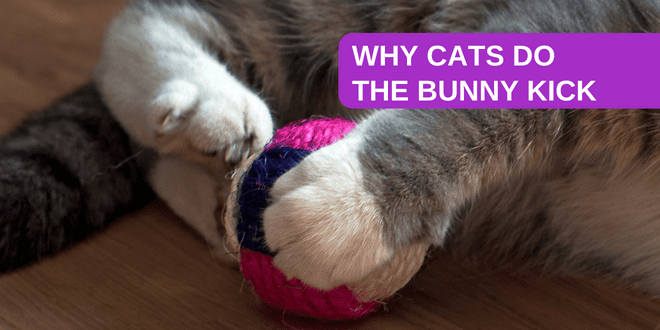
This is a behavior that can be seen during play and also during an aggressive encounter. The cat rolls onto their back or side and kicks with the hind legs. The motive behind the often-called bunny kicking or rabbit kicking, depends on the immediate circumstances.
The Playtime Bunny Kick by Your Cat
You may be playing with your cat when he rolls over, grasps your hand or wrist with the front paws and then rakes the back legs down your arm. This is seen more often when cat parents use their hands to wrestle with their cats in play. The cat may kick out of enthusiastic playtime, but your hand and arm may become more of an opponent than a toy because of the movements made toward your cat (prey tries to get away but opponents move toward the cat) and the size of your hand versus the size of a typical cat toy. Your cat may get carried away with play and begin doing a more intense hind leg kick or he may even flip from playtime to defensive aggression. A cat may also kick with the hind legs when playing with a large toy or stuffed animal. Some toy manufacturers make kick bag toys for cats whose playtime routine typically involves the bunny kick. These toys are essentially a long tube sock filled with catnip-infused stuffing.
Even though your cat may not seriously scratch you if kicking with the hind legs, it’s not a good practice to use your hands as toys and give kitty the opportunity to scratch or even bite. It sends a mixed message about whether it’s acceptable to bite and scratch skin.
Cat companions may engage in hind leg kicking as they wrestle with each other. You’ll know it’s play and not aggression because they will display inhibited kicking without intending to injure each other. Biting and kicking will not have the level of ferocity that would be seen if the cats were engaged in a true battle. During playtime you shouldn’t hear growling, hissing, or screaming. You’ll also see the cats taking turns being the mock aggressor.
The Defensive Bunny Kick by Your Cat
The more serious (and not fun) bunny kick can be displayed, as mentioned above, when you use your hands as toys, but it can also occur when the cat doesn’t want interaction with you. The typical set-up may be that you begin petting the cat and then he rolls onto his back, getting a good grasp of your hand with the front paws and then kitty kicks at your wrist with the hind legs. In many cases, the cat will have given other warnings that petting is not wanted right now. Perhaps the cat has issued a warning nip at your fingers, tried to move away, pawed at you with the front paws, or even issued a meow. Sometimes though, those pre-kick signals don’t occur and the cat just rolls onto his side and begins kicking. Your wrist, especially if you aren’t wearing long sleeves, is a pretty vulnerable spot so even if your cat shows some restraint in kicking, it’s going to hurt!
Petting Your Cat’s Stomach Can be a Trigger
A cat may engage in the hind leg bunny kick if you attempt to pet on the stomach. Your cat may be stretched out on his back and enjoying a nap on a sunny spot of the carpet. It can be hard for a cat parent to resist when you see that soft, furry tummy all exposed. For the most part, many cats don’t like to have their stomachs touched and doing so will trigger an immediate defensive reaction where they will grab your hand and then kick with the hind legs. The bunny kick, when done in a battle situation, is a defensive behavior. When threatened, a cat may roll onto his back to show an opponent that he doesn’t want to do battle but if the fight continues, he will engage all deadly weapons which include not just teeth, but the claws on all four feet. When you attempt to pet the exposed stomach of a cat, in many cases, you put him in that defensive position. There are some cat parents who claim their cats don’t mind, or even seem to enjoy the tummy rub, but I would still advise you to choose safer locations for petting that don’t risk a potential hind leg kick. If your particular cat really does love a good tummy rub, just keep in mind that because one cat likes it doesn’t mean all cats do. Don’t set yourself up for an injury.
Avoiding the Hind Leg Kick
The most practical way to avoid getting bunny kicked by your cat is to never use your hands as toys. The best toy to use when you want to play with your cat is an interactive toy similar to a fishing pole design. The toy at the end of the string puts a safe distance between your hand and the cat’s teeth and claws. This way, your cat can get as enthusiastic as he wants in biting and kicking without causing injury to you. This type of playtime also sends a clear and consistent message that skin is not to be bitten or scratched.
Even when using a small toy to play with your cat, don’t dangle it close by where the cat can grab your hand with front paws and then use hind legs to kick. Small toys are best for solo playtime. Put little toys such as furry mice or crinkle balls inside an open paper bag or toss them on the perch of cat tree for your cat to discover.
If your cat really enjoys hind leg kicking during playtime then consider purchasing or making a kick bag toy.
Another very important factor when it comes to avoiding the bunny kick is to know your cat’s petting preferences and stick to the areas on the body that are enjoyable for kitty. Be observant of your cat’s body language as well so you can tell when he’s getting close to petting tolerance limits.
Need More Information on Cat Behavior?
For more specific information on cat behavior and training, refer to the books by best-selling author Pam Johnson-Bennett. Books are available in bookstores and online. We’ve also included links to Amazon here on our website.
If you have a question about your cat’s behavior or health, contact your veterinarian. This article is not intended as a medical diagnosis nor is it a replacement for your cat’s regular veterinary care. This article is for general information purposes only.

